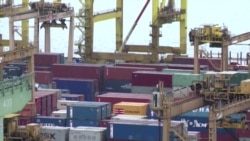Twelve Pacific Rim countries have set the stage for what may become the world’s largest trading bloc.
After more than five years of negotiations, ministers from Australia, Brunei, Canada, Chile, Japan, Malaysia, Mexico, New Zealand, Peru, Singapore, Vietnam and the United States gathered in Auckland, New Zealand, Thursday to sign the Trans-Pacific Partnership (TPP) agreement.
Yet the landmark free trade deal faces more roadblocks before it becomes a done deal.
With a combined trade of more than $1.5 trillion, the 12 countries that make up the TPP are responsible for 40 percent of the world’s economy.
Opportunity to increase market
For U.S. companies, it’s an opportunity to sell more products. And for a president in his final year in office, a chance to expand his legacy and counter China’s growing influence in the Pacific.
"With TPP, China doesn't set the rules in that region, we do. You want to show our strength in this new century? Approve this agreement. Give us the tools to enforce it," President Barack Obama said during his State of the Union speech in January.
TPP would eliminate tariffs on thousands of U.S. products, and create common trading standards, but not if protesters around the world have their say.
In Santiago, Chile, farmers worry about the impact of new biotech standards.
In Kuala Lumpur, protesters claim the U.S. wants to control business in Malaysia.
Critics of TPP
And in Washington, where activists gathered on a rain-soaked day, TPP is an example of corporate greed run amuck.
Labor groups claim TPP is a betrayal of American workers and businesses, who will not be able to compete with lower wage earning countries.
U.S. Trade Representative Michael Froman says that's not true, that TPP will boost exports and add $100 billion to the U.S. economy each year.
“If through this trade agreement, we can disproportionately reduce barriers to other markets, bring down tariffs that are much higher in Japan, Vietnam, Malaysia, etc., so that we can get access to those markets; raise standards in those countries so that we have a more level playing field on which we can compete, we’re going to increase our exports," Froman said.
However, many protesters aren't buying it.
Even as finance ministers from the TPP countries sign the landmark agreement in New Zealand, conservative estimates suggest a working deal may be at least two years away.
Lawmakers in TPP countries still need to review thousands of pages of new regulations. And despite prodding by the U.S. president, analysts say congressional approval in an election year is highly doubtful.







